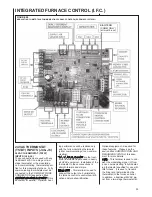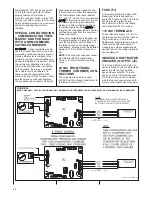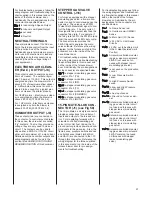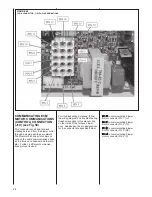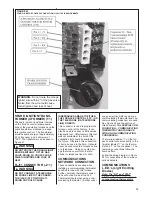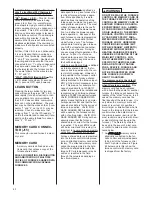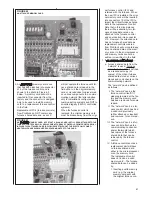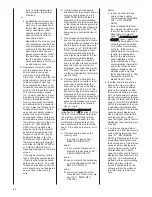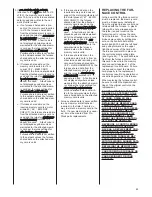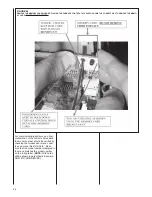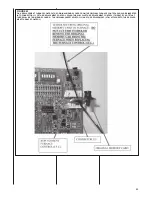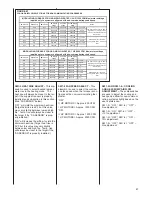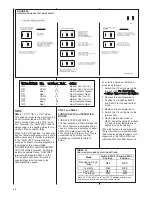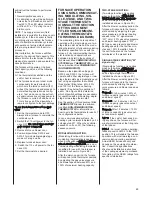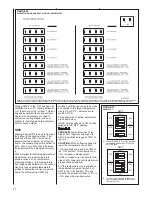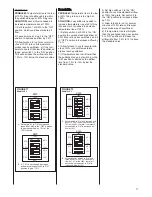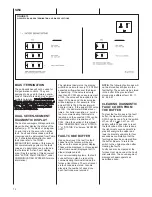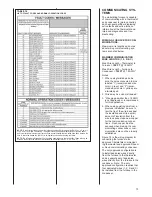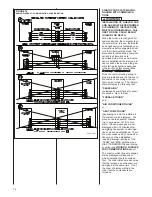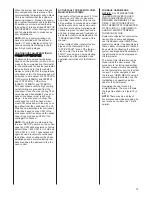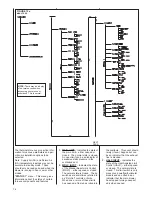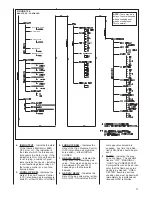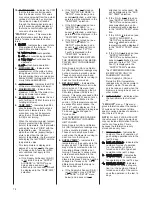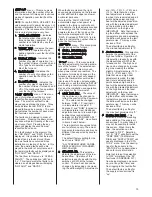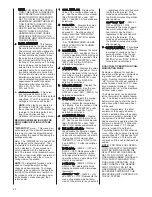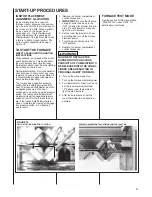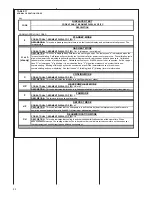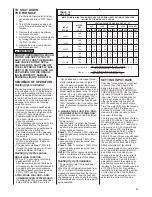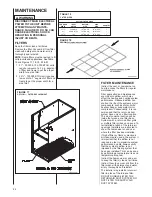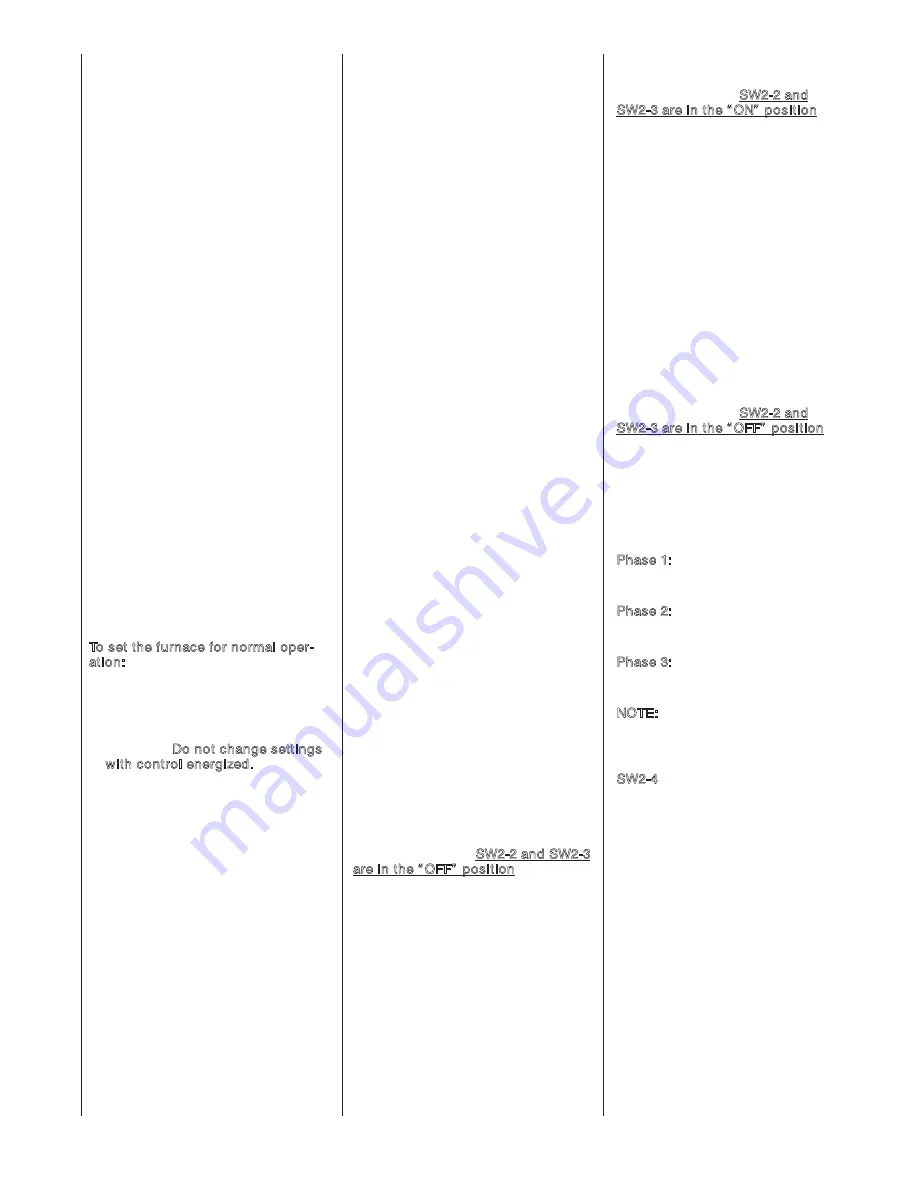
69
FURNACE OPERATION
USING NON-COMMUNICAT-
ING MODULATING, SIN-
GLE-STAGE, AND TWO-
STAGE THERMOSTATS
(CONSULT THE SECTION
OF THIS DOCUMENT
TITLED NON-COMMUNI-
CATING THERMOSTATS
FOR WIRING DIAGRAMS)
The modulating furnace is capable of
operating with a single-stage or a two-
stage thermostat as well as the modu-
lating thermostat or fully communicating
thermostat specified for use with the
furnace. Fully communicating thermo-
stat functions and operations are
explained in detail in the sections of
this manual titled
COMMUNICATING
SYSTEMS
and
THERMOSTATS
(under
the sub-section titled
COMMUNICAT-
ING THERMOSTATS)
.
Based on the dipswitch settings of
SW2-2 and SW2-3, the furnace will
operate with either single-stage or two-
stage thermostats as a modulating sys-
tem using an algorithm that utilizes
three distinct firing rates; 40%, 65%
and 100% of the furnace heating
capacity (See below for operation of
each). See Figure 68 to determine
which dipswitch settings are necessary
for operation with a modulating, single-
stage or two-stage thermostat.
See the section of this document titled
THERMOSTATS
(under the sub-sec-
tion titled
NON-COMMUNICATING
THERMOSTATS)
for information on
how to wire the thermostats for each of
the configurations below.
In non-communicating systems, the
heating cycle is always initiated by a 24
volt signal on W1. When the controller
senses 24 volts on W1, the following
sequence occurs:
MODULATING FUNCTION:
(Modulating function with a non-com-
municating thermostat only applies
when both switches SW2-2 and SW2-3
are in the “ OFF” position and a non-
communicating modulating thermostat
(specified for use with the furnace) is
installed as shown in Figure 88.)
After the warm-up period, the furnace
will respond to the thermostat demand
by adjusting the gas valve pressure
and blower speed between 40% and
100% of maximum heating capacity.
will instruct the furnace to perform as
follows:
1 Normal ignition sequence
2 A calibration cycle will be performed
unless the Test Switches are set for
Test 40%. The LED status indicator
will flash “H” or “h” during the cali-
bration cycle.
NOTE: The supply air sensor (field
installed) is required for the furnace cali-
bration cycle. If the air sensor is faulty,
or not properly connected, the furnace
will not attempt a calibration cycle and
will operate on factory default parame-
ters pre-programmed into the micro-
processor.
After calibration, the furnace will then
adjust to the desired Test capacity. This
allows time for the technician to check
steady-state operation and evaluate fur-
nace performance.
The furnace will operate at the fixed
Test capacity until one of the following
conditions:
A. The thermostat is satisfied and the
call for heat is removed.
B. The furnace has been in test mode
continuously for sixty minute
s, at
which time the furnace control (IFC)
will exit the test mode and proceed to
normal heating operation as config-
ured. Test mode can not be activat-
ed again unless line voltage power to
the furnace is cycled off and back on.
This is true even if the dipswitches
remain configured to the test settings.
To set the furnace for normal oper-
ation:
1 Set the thermostat mode to OFF.
Always allow furnace to complete the
cool down cycle.
2 Switch the 115 volt power to the fur-
nace OFF. Do not change settings
with control energi
z
ed.
3 Remove furnace blower door.
4 Position dipswitches SW2-2 and
SW2-3 for modulating/single-stage
mode or 2-stage mode.
5 Replace furnace blower door.
6. Switch the 115 volt power to the fur-
nace ON.
7. Set the thermostat as desired.
TWO-STAGE FUNCTION:
(Two-stage function only applies
when both switches SW2-2 and
SW2-3 are in the “ ON” position
and a two-stage thermostat is
installed as shown in Figure 90.)
After the blower on-delay period, the
furnace will respond to the thermo-
stat demand by adjusting the gas
valve pressure and blower heating
speeds to the “W” signal values.
“W1” only = 40% gas valve pressure
and blower heating speed. “W2” =
65% gas valve pressure and blower
heating speed for the first five min-
utes and 100% thereafter. Also, if
the call for heat ends, the furnace
terminates at the present rate.
SINGLE-STAGE FUNCTION (“W”
signal only) :
(Single-stage function only applies
when both switches SW2-2 and
SW2-3 are in the “ OFF” position
and a single-stage thermostat is
installed as shown in Figure 89.)
After the blower on-delay period, the
furnace will respond to the thermo-
stat demand by altering the gas
valve pressure and blower speed as
follows:
Phase 1: 0 to 5 minutes = 40% of
furnace capacity (gas valve output
and blower speed)
Phase 2: 5 to 12 minutes = 65% of
furnace capacity (gas valve output
and blower speed)
Phase 3: After 12 minutes = 100%
of furnace capacity (gas valve out-
put and blower speed)
NOTE: If the call for heat ends dur-
ing any phase, the furnace will ter-
minate immediately at the firing rate
of that phase.
SW2-4 - For most cooling operation,
leave dip switch SW2-4 in the “OFF”
position. This will enable the furnace
operation with most two-stage, non-
communicating cooling equipment.
Actual SEER values will vary and
depend on the equipment combina-
tion. Consult the specifications
sheets and installation instructions
of the cooling equipment purchased
for a listing of the SEER ratings for a
specific combination.
Summary of Contents for RGFE
Page 92: ...92 TABLE 21 FURNACE FAULT CODES EXPANDED W DESCRIPTIONS AND SOLUTIONS CONTINUED ...
Page 93: ...93 TABLE 21 FURNACE FAULT CODES EXPANDED W DESCRIPTIONS AND SOLUTIONS CONTINUED ...
Page 94: ...94 TABLE 21 FURNACE FAULT CODES EXPANDED W DESCRIPTIONS AND SOLUTIONS CONTINUED ...
Page 95: ...95 TABLE 21 FURNACE FAULT CODES EXPANDED W DESCRIPTIONS AND SOLUTIONS CONTINUED ...
Page 96: ...96 TABLE 21 FURNACE FAULT CODES EXPANDED W DESCRIPTIONS AND SOLUTIONS CONTINUED ...
Page 97: ...97 TABLE 21 FURNACE FAULT CODES EXPANDED W DESCRIPTIONS AND SOLUTIONS CONTINUED ...
Page 98: ...98 TABLE 21 FURNACE FAULT CODES EXPANDED W DESCRIPTIONS AND SOLUTIONS CONTINUED ...
Page 99: ...99 TABLE 21 FURNACE FAULT CODES EXPANDED W DESCRIPTIONS AND SOLUTIONS CONTINUED ...
Page 102: ...102 TABLE 21 FURNACE FAULT CODES EXPANDED W DESCRIPTIONS AND SOLUTIONS CONTINUED ...
Page 103: ...103 TABLE 21 FURNACE FAULT CODES EXPANDED W DESCRIPTIONS AND SOLUTIONS CONTINUED ...
Page 104: ...104 TABLE 21 FURNACE FAULT CODES EXPANDED W DESCRIPTIONS AND SOLUTIONS CONTINUED ...
Page 105: ...105 TABLE 21 FURNACE FAULT CODES EXPANDED W DESCRIPTIONS AND SOLUTIONS CONTINUED ...

